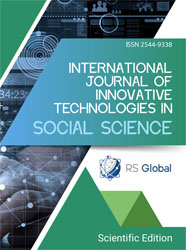A LITERATURE REVIEW ON EUROPEAN INTEGRATED BORDER MANAGEMENT
Abstract
In the wake of the Schengen Agreement, the EU has assumed the role of maintaining European security, and border integration management has been ranked among the top priorities for the EU. It is necessary to improve border integration management to advance the integration process. Despite this, border integration management in the EU has been challenging, particularly since the refugee crisis of 2015. This article analyzes the current directions and trends of relevant research on border integration management in the EU. Three main areas of research on border integration management are currently being conducted: migration policy, border control agency, and border integration problems. The study concluded that theoretical and organizational analysis need to complement border management research.
References
Baker-Beall, C. (2019). The threat of the 'returning foreign fighter': The Securitization of EU migration and border control policy. Security dialogue, 50(5), 437-453.
Börzel, T. A., & Risse, T. (2018). From the euro to the Schengen crises: European integration theories, politicization, and identity politics. Journal of European Public Policy, 25(1), 83-108.
Campesi, G. (2018). Crisis, migration and the consolidation of the EU border control regime. International Journal of Migration and Border Studies, 4(3), 196-221.
Carrera, S. (2007). The EU border management strategy: FRONTEX and the challenges of irregular immigration in the Canary Islands (No. 261). CEPS.
Carrera, S., Blockmans, S., Gros, D., & Guild, E. (2015). The EU's response to the refugee crisis: Taking stock and setting policy priorities. CEPS essay, (20/16).
Ceccorulli, M. (2019). Back to Schengen: the collective securitisation of the EU free-border Area. West European Politics, 42(2), 302-322.
Ceccorulli, Michela and Sonia Lucarelli (2018). 'Migration', in James Sperling and Spyros Economides (eds.), The EU's Security Strategies. Abingdon, Oxon and New York: Routledge.
Chebel d’Appollonia, A. (2019). EU migration policy and border controls: from chaotic to cohesive differentiation. Comparative European Politics, 17(2), 192-208.
De Somer, M. (2020). Schengen and internal border controls. From Tampere 20 to Tampere 2.0: Towards a new European consensus on migration, 119-131.
Duez, D. (2014). A community of borders, borders of the community: The EU's integrated border management strategy. Borders, fences and walls: State of insecurity, 51-66.
Ekelund, H. (2014). The establishment of FRONTEX: A new institutionalist approach. Journal of European Integration, 36(2), 99-116.
Felbermayr, G., Gröschl, J., & Steinwachs, T. (2018). The trade effects of border controls: Evidence from the European Schengen Agreement. JCMS: Journal of Common Market Studies, 56(2), 335-351.
Fijnaut, C. (2015). The refugee crisis: The end of Schengen? European Journal of Crime, Criminal law and criminal justice, 23(4), 313-332.
Geddes, A., & Scholten, P. (2016). The politics of migration and immigration in Europe. Sage.
Green, S. (2013). Borders and the Relocation of Europe. Annual Review of Anthropology, 42(1), 345-361.
Guiraudon, V. (2018). The 2015 refugee crisis was not a turning point: Explaining policy inertia in EU border control. European Political Science, 17(1), 151-160.
Hobolt, S. B., & De Vries, C. E. (2016). Public support for European integration. Annual Review of Political Science, 19(1), 413-432.
Horii, S. (2016). The effect of Frontex's risk analysis on the European border controls. European Politics and Society, 17(2), 242-258.
Karamanidou, L., & Kasparek, B. (2018). Border Management and Migration Control in the European Union.
Kriesi, H., Altiparmakis, A., Bojar, A., & Oana, I. E. (2021). Debordering and re-bordering in the refugee crisis: a case of 'defensive integration'. Journal of European Public Policy, 28(3), 331-349.
Neal, A. W. (2009). Securitization and risk at the EU border: The origins of FRONTEX. JCMS: Journal of common market studies, 47(2), 333-356.
Nedergaard, P. (2019). Borders and the EU legitimacy problem: the 2015–16 European Refugee Crisis. Policy Studies, 40(1), 80-91.
Pollak, J., & Slominski, P. (2009). Experimentalist but not accountable governance? The role of Frontex in managing the EU's external borders. West European Politics, 32(5), 904-924.
Rigo, E. (2005). Implications of EU enlargement for border management and citizenship in Europe.
Schimmelfennig, F. (2018). European integration (theory) in times of crisis. A comparison of the euro and Schengen crises. Journal of European Public Policy, 25(7), 969-989.
Slominski, P. (2013). The Power of Legal Norms in the EU's External Border Control. International Migration, 51(6), 41-53.
Sweet, A. S., & Sandholtz, W. (1997). European integration and supranational governance. Journal of European public policy, 4(3), 297-317.
Takle, M. (2012). The treaty of Lisbon and the European border control regime. Journal of contemporary European research, 8(3).
Wæver, O. (1993). Securitization and desecuritization (p. 48). Copenhagen: Centre for Peace and Conflict Research.
Wolff, S. (2008). Border management in the Mediterranean: internal, external and ethical challenges. Cambridge review of international affairs, 21(2), 253-271.
Zaiotti, R. (2007). Revisiting Schengen: Europe and the emergence of a new culture of border control. Perspectives on European Politics and Society, 8(1), 31-54.
Views:
696
Downloads:
423
Copyright (c) 2022 Xuedan Yao

This work is licensed under a Creative Commons Attribution 4.0 International License.
All articles are published in open-access and licensed under a Creative Commons Attribution 4.0 International License (CC BY 4.0). Hence, authors retain copyright to the content of the articles.
CC BY 4.0 License allows content to be copied, adapted, displayed, distributed, re-published or otherwise re-used for any purpose including for adaptation and commercial use provided the content is attributed.











